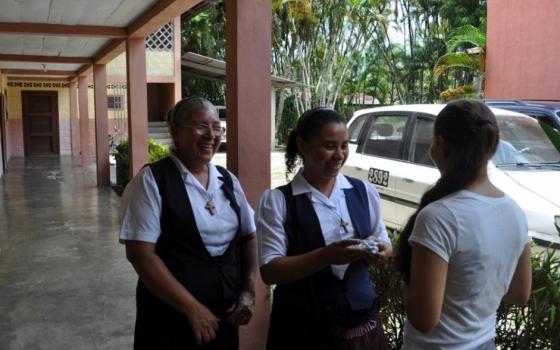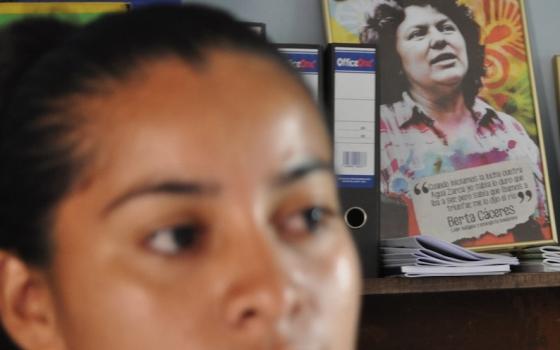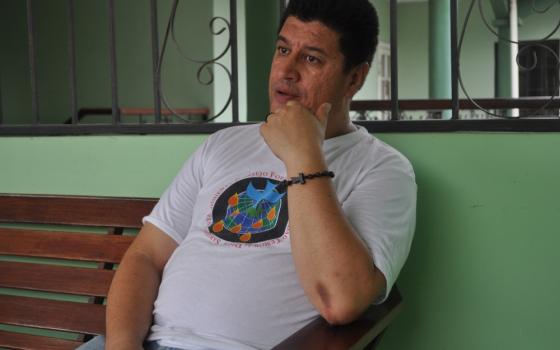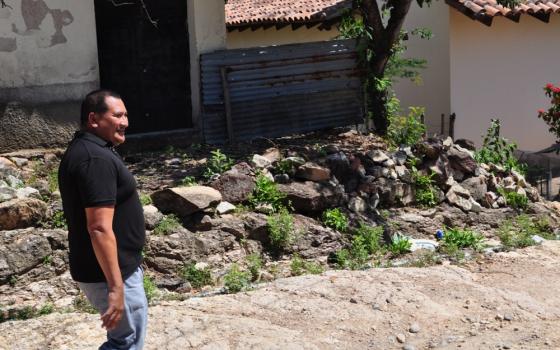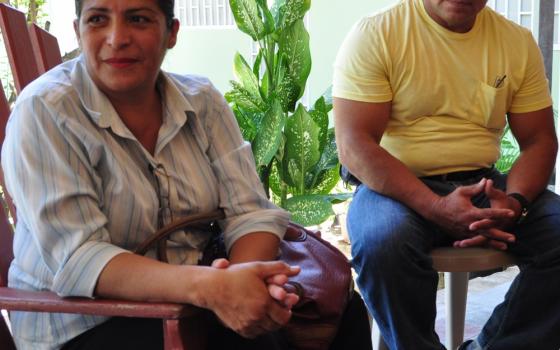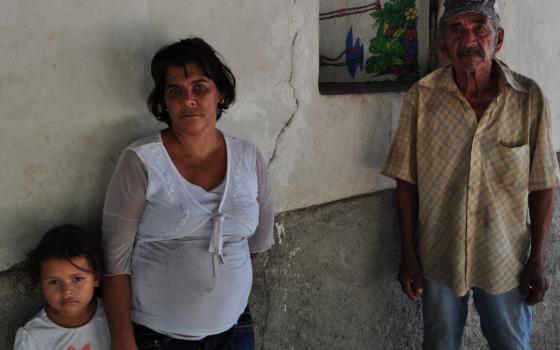Global Sisters Report is focusing a special series on mining and extractive industries and the women religious who work to limit damage and impact on people and the environment, through advocacy, action and policy. Pope Francis last year called for the entire mining sector to undergo "a radical paradigm change." Sisters are on the front lines to help effect that change.
The mines no longer operate.
The large trucks that carried heavy equipment no longer rumble down dirt roads fogging the air with dust.
The workers no longer trudge along those same roads inhaling the dust weighted by the humidity of dawn.
Community opposition succeeded in shutting down mines in Nueva Esperanza in northern Honduras and El Tránsito far to the south near the border of Nicaragua. But to many people in these two small towns the closings serve only as a pyrrhic victory.
For now, the armed guards that circled the mines are gone. But gone, too, are the jobs the mines provided. In their place is a lingering loss of trust among residents in these agricultural communities and a continuing fear that this is just a temporary respite before the mines in both towns reopen.
The privately owned mines began their operations in regions where families had subsisted off the land for centuries. The mines' presence altered both the landscape and the social fabric of these communities.
Now, more than two years after countless protests stopped the mines, the fault lines between those who support mining and those who don't because of concern about the potential for environmental damage and the loss of a way of life continue to divide communities and even some families. More disturbingly, death threats toward opponents of mining have become an increasing concern, especially since the murder of Honduran environmental activist Berta Cáceres in March of this year.
Honduras now has the highest murder rate for environmental activists in the world, and conflict over land rights is the primary driver. Rampant inequality, a weak judicial system, cozy relationships between political and business elites, and near total impunity for crimes against human rights defenders have contributed to 109 murders of environmental activists between 2010 and 2015, according to Global Witness, a British non-governmental organization which tracks human rights and environmental abuses.
"We were threatened: 'You better not show your face in this town again,' " said Sr. Maria de Rosario Soriano, a member of the Messengers of the Immaculate order, who with other sisters from her community supported anti-mining activists in Nueva Esperanza. "We didn't go to Nueva Esperanza for a few weeks. Even the priests and our mother superior told us it was better to stay away for a while."
Hundreds of miles away, outside El Tránsito, where tree-lined mountains punctuate a seared skyline of hazy heat, Sr. Reyna Corea sat in the shaded terrace of Hermanas of Our Lady of the Holy Rosary. She knew of the struggles in Nueva Esperanza but said with evident relief that El Tránsito was not as divided. However, she added, all was not well. Differences between the residents of El Tránsito and implicit threats existed there, too.
"I feel I'm discriminated against by the police and municipality," said Corea, 51, who opposed mining in El Tránsito. "When I need help to bring water to a community, they deny me and the other sisters. They say we are with those activists who protest and riot. They say we are with the instigators. They say, 'You better stop what you are doing.' In Honduras, such a warning makes an impression."
The mine comes to Nueva Esperanza
Nueva Esperanza is home to about 1,000 people. Five rivers run through it: Leán, Congo, the Metalias, Santiago and Alao. The town sits at the foot and climbs up the slopes of the mountains that separate the department or county of Atlántida from the neighboring department of Yoro. The mountains hold gold, iron and other mineral deposits. Dirt roads, some not more than paths, line the mountains. The people here farm the rich soil, harvesting corn, beans and other basic staples.
"We are poor," a woman said near the church in Arizona, about a two-hour drive from Nueva Esperanza, "but we are not hungry."
Between 2011 and 2013, when businessman Lenir Perez, owner of the Minerales Victoria mining company, purchased 2471.05 acres, covering all of Nueva Esperanza and 15 other farming communities, the residents of Nueva Esperanza "were victims of militarization and para-militarization of their territories, persecution and threats, and police and judicial harassment," according to a co-sponsored report by El Equipo de Reflexión, Investigación y Comunicación (ERIC), a Jesuit-sponsored investigation and research organization in Honduras, and the College for Public Health and Social Justice at Saint Louis University of Missouri. The June 2016 report found that families lived under siege. Activists received death threats from the police and anonymous callers by phone and text messaging.
"For more than a year we could not go out after 6 p.m.," said activist Olga Hernandez, 29, a Nueva Esperanza resident. "Private security from the mine patrolled the streets. Nothing ever happened. It was a psychological thing: 'Don't go out, or else.' That 'or else' kept us inside."
Despite the intimidation, Soriano spoke out against the mine.
"The mine first came offering jobs and huge amounts of money for land," she recalled. "So, we started telling the community, 'Don't be naive and believe in everything they offer.'"
Soriano said she and another sister, Presentación Aguilar, organized community meetings in local churches to discuss mining and its impact on health and the environment. They cited the Book of Genesis and how it called on mankind to protect nature, not exploit it.
Perez, the sisters said, never confronted them. But men with guns who did not wear police or military uniforms observed their meetings. They did not attend but peered through windows.
"We had to give talks with armed goons looking in on us," Soriano said. "It came to a point where we were so afraid we called our mother superior and asked her if we should leave or stay. She told us to look into our hearts and we felt we could not leave the community."
The sisters stayed, but the harassment, they said, continued even within the church. At one meeting, Aguilar discussed her opposition to mining when a member of the church jumped up and told her to shut up and stop spreading lies.
"You could feel the anger and the uproar in the entire community," said Aguilar. "Hatred was in the air between those who worked for the mine and those who opposed it. Even in church gatherings."
Although Perez, who did not return repeated phones calls and emails requesting an interview for this story, never confronted the sisters, he did communicate with the vicar of the nearby parish of Arizona. A priest there, Fr. Cesar Espinoza, had been voicing his support for those who opposed mining.
"I spoke out against the mine," Espinoza, 39, recalled. "On local radio, from the pulpit. I asked the bishop to speak out against it. I spoke everywhere and wrote my opinions for publications."
In May 2013, Espinoza's supervisor, the vicar, exchanged emails with Perez. He chastised Perez for not being candid about his operation and for increasing antagonism.
"Do you think being transparent is to sneak in machinery on a Saturday escorted by the police?" Vicar Victor Camara wrote in an email, a copy of which was provided to Global Sisters Report. "Have you chosen force and conflict? I hope that you ponder the consequences and that above all no human lives be put at stake, since no human life is worth all the gold in the world. Please know that with conflict there will be no winners, everybody will lose, including you."
Perez responded that he "only believed in doing things in an honest way." He said it saddened him to see Honduras "taken apart by businessmen, drug dealers, politicians and environmentalists (communists and subversive curas)." Curas is a derogatory term for priests. Perez also accused the church of cowardice for not having stopped Espinoza's advocacy against the mine. He called Espinoza "another sinner behind his robe."
"Believe me, I would like to open that mine hand in hand with the community," Perez wrote, "but I will not allow a Guatemalan [Espinoza] and the activists to destroy this country."
Two months later, on July 25, 2013, Orlane Vidal and Daniel Langmeier, with the Honduras Accompaniment Project, a program of the Friendship Office of the Americas designed to engage in nonviolent protest in Honduras, were held captive for two and a half hours by armed men, who, according to Amnesty International, were from the Nueva Esperanza mining project.
The observers had been staying with a family opposed to the mine. Amnesty International found that the leader of the armed men told Vidal and Langmeier that they would be "disappeared in the woods" if they returned to the area. The observers were held at gunpoint and warned not to speak publicly about their abduction. They were released at a bus stop in Nueva Florida, a town not far from Nueva Esperanza. They filed complaints with the authorities. The abductors were not charged.
"It was like an amber alert when we heard about the abduction," Espinoza recalled. "Everyone — activists, church members — called the government demanding their release. The vice president issued the order to locate them immediately."
The kidnapping galvanized the community. Honduran law allows mayors the final decision on whether a mine can or cannot operate in their township. In the municipal elections of 2013, anti-mine activists met with mayoral candidates and asked them to sign an anti-mining pledge. On August 20, 2014, upon taking office, the newly elected mayor, Mario Fuentes, closed the Nueva Esperanza mine. But activists say the closing did not end the matter.
"The problem is still ongoing," said Sr. Aguilar. "The mine still owns the land. What will happen if we elect a mayor who supports mining?"
Activist Olga Hernandez said the land remains as scarred as the community.
"Today, you see plants and trees growing back but the personal damage is like the mountains they flattened. You can't make a mountain grow back."
After the mine closed, resentful, unemployed mine workers unleashed their anger toward the activists, said Arizona deputy mayor Cesar Alvarenga, an opponent of the mine. He said his wife left him because of the threats.
"Yes, I still get threats," Alvarenga said. "This fight has ruined my life. It is very difficult to live with fear because we know these people are so powerful. They have money and the support of the government and won't go away easily. They invested a lot of money, and we know they won't lose it like that."
A town with a 200-year-old mining history
More than 500 miles south of Nueva Esperanza, the town of El Tránsito stands beneath a wide sky and bright sun that scorches the land with a dry heat far different from the humidity that wraps the mountains of Nueva Esperanza.
The El Tránsito mine dates back to the early 1800s. Hundreds of mining tunnels, residents say, run beneath the town like a maze of prairie dog burrows, destabilizing centuries-old buildings. Decades of mining, residents say, polluted local waters making it unfit for human consumption because of high levels of cyanide and lead, among other heavy minerals. There are no known official reports, but residents say they don't use the water.
"We used to play in the closed mines," recalled activist Jose Lucio Lopez, 43, who grew up in El Tránsito. "It was a beautiful little town. Quiet. Nothing was ever disturbed."
The mine had been closed for decades when it started operations again in 2014 after Honduran businesswoman Maria Gertrudis Valle claimed the land as belonging to her. She did not respond to messages from GSR asking for comment.
"Five years ago this woman came into town," recalled Sr. Reyna Corea. "She said she had documents that showed this land belonged to her. She sent representatives to speak for her. She was like a ghost, rarely seen but known to exist."
At first, Corea said, the residents of El Tránsito supported the mine until its workers began using explosives. The ground trembled and the walls and floors of houses began to crack.
"They dynamited day and night," Lopez said. He said as many as 200 people from outside the town would come to work in the mine.
"The whole town would shake from the dynamite," Lopez said. "As many as 80 explosions a day, every day."
More than 200 activists, he said, organized sit-ins blocking the road to the mine. Twenty people always occupied the road 24 hours a day. If activists saw a stranger in town they suspected of being with the mine or an unfamiliar vehicle, they would ring the church bell, a call to activists to support the people at the sit-in. The protesters would not allow miners who had managed to enter the property to leave. Police were forced to bring them food and water. A year after the sit-ins began, the mine ceased operations in November 2015. Success, however, has not lessened the threats activists here say they face.
"People have tried to bribe us to be quiet," said Lourdes Zelaya, 43, a mother of two children, of herself and her husband. "We have been chased by cars and motorcycles trying to force us off the road. People tell us, 'Watch out. You will be killed.' At the sit-in, a police officer told my husband, 'You will be killed.' We tried to file a complaint, but the police department refused to take it."
Her 18-year-old daughter Marci said she, too, feels in danger.
"I live in fear something will happen to me because of what is happening to my parents," she said. "I'd like to help them but I don't know how. I am vulnerable. I know they can hurt my parents by doing something to me."
The ongoing threats against activists suggest that the mine owner or other business interests hope to reopen the mine, Corea said.
"As in Nueva Esperanza and all over Honduras, the mine owners will keep trying," she said. "They will not fall asleep because the mine is not operating. Of course, the problem always comes down to money. People see cash and they lose sight of things, so if money comes then we can't say what will happen."
[J. Malcolm Garcia is a freelance writer and author of The Khaarijee: A Chronicle of Friendship and War in Kabul, What Wars Leave Behind: The Faceless and the Forgotten. He is a recipient of the Studs Terkel Prize for writing about the working classes and the Sigma Delta Chi Award for excellence in journalism.]
Related - Murder of Berta Cáceres sends dark message to Honduran environmental activists
